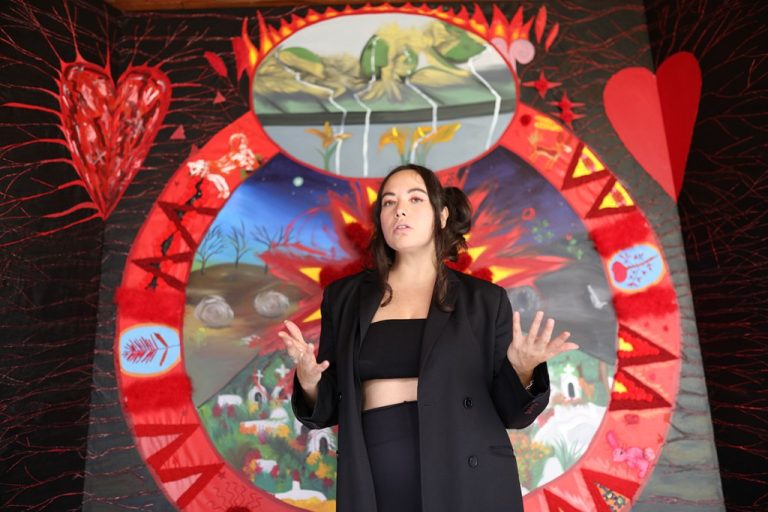Frieda Toranzo Jaeger, the artist whose work was featured prominently at this year’s Venice Biennale, said her pro-Palestinian views cost her an exhibition in Berlin. and lost $19,000 in stipends.
The Gunther Pell Foundation awarded her the stipend earlier this month. As part of the award, Toranzo Jaeger also won an exhibition at the Leopold-Hoesch-Museum, a private museum in Düren, Germany, as well as $10,500 to produce a catalog associated with the exhibition, which is planned for Held in 2026.
Shortly after she was named a grant recipient, the foundation and museum canceled the grant and associated exhibition. In a statement posted on social media, the foundation and museum said they were informed that Toranzo Jaeger had signed a letter circulated by the Strike Germany movement urging artists not to engage in “regulatory artist politics,” in particular It’s those who have a Palestinian perspective.
“During the discussions, it became clear that the artist stands by her signature on the appeal, which the museum and foundation unequivocally respect,” said a statement from the foundation, the museum and Toranzo Jaeger. “Since cooperation means that museums and foundations meet the conditions and support requirements set out by STRIKE GERMANY, they will not be involved. Frieda Toranzo Jaeger, the Leopold Hoesch Museum and the Günther Peill Foundation have therefore jointly decided to avoid the anticipated changes in scholarships and exhibitions cooperate.”
The statement said the decision was made by “mutual consent,” but in an interview art newsToranzo Jaeger questioned this. “The agency and the foundation coerced me into agreeing to their statements,” she said, adding that she felt she had little legal recourse to do anything else.
A spokesman for the city of Dillon, whose office represents the museum, said in an email art news”, “From the beginning, there was no pressure on the artist and a statement based on consensus was reached. We were surprised that Frida now presented this in a different way. Artists, museums, and foundations are sad that this solution must be found. ”
Toranzo Jaeger’s futuristic car paintings can be seen in venues such as New York’s MoMA PS1 and Mexico City’s Museo Jumex. She said she was denied the opportunity by the Günther Peill Foundation and the Leopold-Hoesch-Museum after journalist Kito began asking questions about her question.
In the reviewer’s email art newsNedo, was sueddeutsche Zeitung and serves as contributing editor lintelcontacted the foundation, the museum and Toranzo Jaeger’s gallery, pointing out her signature on the striking German letter. He also submitted screenshots of pro-Palestinian Instagram posts she liked and said he was seeking a statement from her. He didn’t say whether he was doing this for the sake of the story he was working on.
Arrivals: art newsNedo said the emails were not intended for public disclosure and declined further comment. A Dylan spokesman confirmed that an unnamed journalist had informed the foundation and museum of Toranzo Jaeger’s support for striking Germany.
Toranzo Jaeger called Nedeau’s emails a form of “harassment.” She confirmed that she liked certain pro-Palestinian posts, including one by 2024 Venice Biennale alumna Daniela Ortiz, who posted an image of an upside-down red triangle. The symbol has been widely used by pro-Palestinian demonstrators, and although its origins date back more than a century to the 1917 Arab uprisings, the Anti-Defamation League claims it is intended to “glorify” Hamas. Of the posts she liked, Toranzo Jaeger said: “All of them were pretty innocuous and things I retweeted.”
Strike Germany, supported by artists such as Jesse Darling and Lawrence Abu Hamdan, is sometimes interpreted as a boycott of German institutions, but Toranzo Jaeger Jaeger said that was not the case and that she did not see cooperation with private German museums as a form of resistance. Contrary to movement. Instead, she said she intended to use the resources spread by Strike Germany to negotiate with German institutions.
Furthermore, she said she believed that in two years’ time the new political situation would make concerns about “strike Germany” obsolete.
“I’m not a perfect political subject,” she said. “I do not represent strike Germany. But I am united.”


